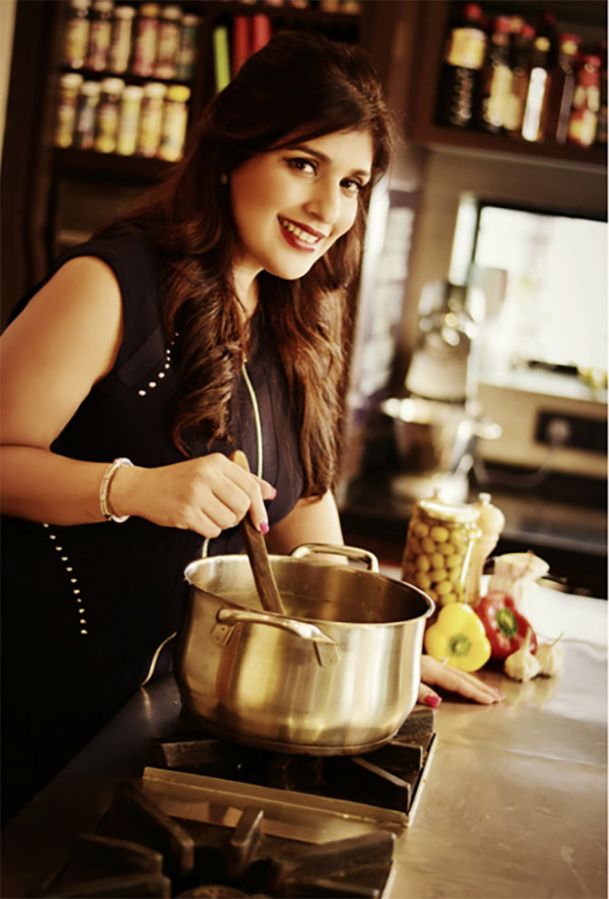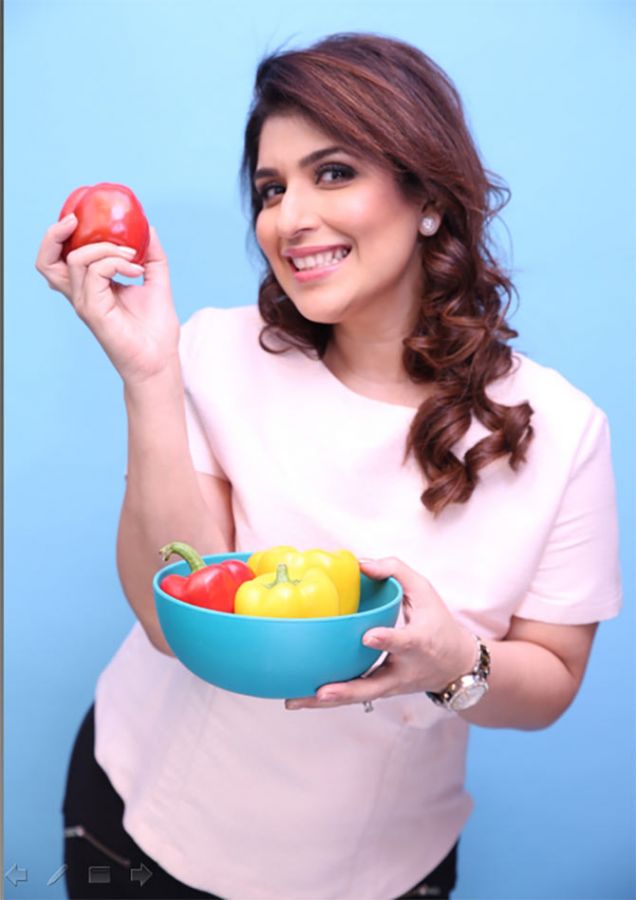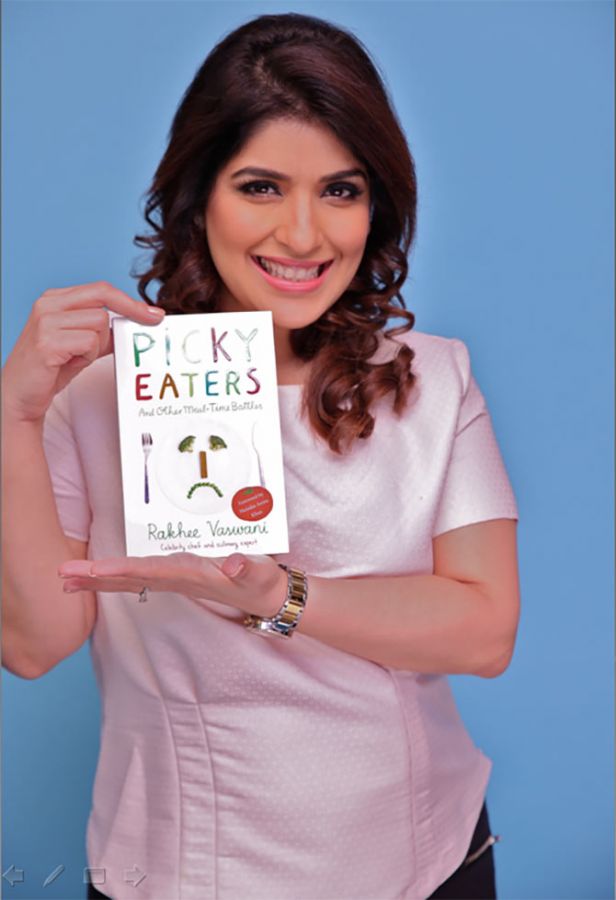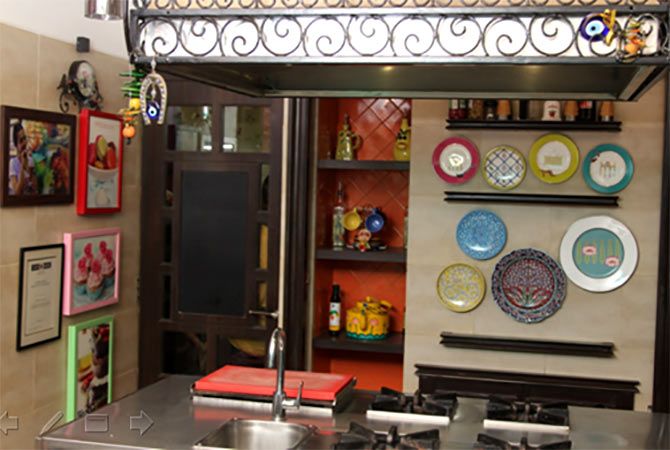What makes cooking such a fun and lively profession? Chef Rakhee Vaswani has the answer!

There are chefs. And there are masterchefs.
Then there are those for whom cooking is a way of life.
Homemaker turned celebrity chef Rakhee Vaswani belongs to the latter category.
She was 11 when she first started cooking, attempting a traditional Sindhi curry for her family. "Everyone simply loved it," she says.
If you have watched Rewind with Rakhee or Super Foods on Living Foodz channel, you'll be amazed at the way she communicates with her ingredients.
Right from researching the background of the recipe to making it palatable and also look attractive, Vaswani never hesitates to go the extra mile and add her magical touch to everything she cooks.
A first-generation entrepreneur, she started Palate Culinary Studio -- a first-of-its-kind learning institute set in Santa Cruz in Mumbai, that was inaugurated by one of her students Malaika Arora Khan -- when she was 38.
She is a certified baker from Le Cordon Bleu in London and has a master's degree in sugar craft from the International Centre of Culinary Arts, Dubai.
The mother of two -- she has a son, 16, and daughter, 18 -- recently released her maiden book Picky Eaters published by Random House India. Leading Indian chefs showed up for the event.
In a freewheeling chat with Divya Nair/Rediff.com, chef and author Rakhee Vaswani talks about her passion for cooking, her daily struggles as a mompreneur and how she's spreading smiles through her recipes.
You are a popular chef and a mother. Why did you write Picky Eaters?
Picky eaters come in all sizes. Each family will have different examples.
Even when I do cooking classes, people come to me and ask me how they can make their kids eat spinach, capsicum or methi.
Over the years I have realised that not just kids, even grow-ups have aversions to certain foods.
In reality, no food is entirely good or bad; you are not having it simply because it is not presented in a way that you wanted to try it.
Sometimes, for me, if a Dal Khichdi does not look good, I would not touch it. Same goes for most of us.
Through the book, I wanted to (say) that picky eaters are not to be targeted; one needs to understand the problem and tackle it smartly.
The recipes I have shared in the book are very simple and doable. The photographs have been shot in my studio (Palette Culinary Studio).
All the recipes I have compiled, I have been making in my kitchen for years now.
Writing the book also required me to do a lot of research -- about nutrition facts, etc.
At the same time, I did not want to impose anything on anyone.
In the end, I think I have managed to sum it all fairly well; I have presented the problem and also the solution.
How can one deal with picky eaters?
The fact is you cannot cut anything from diets. Carbs are as important as proteins and fats. What I do is I try and make my food interesting.
If my kids don't drink milk, I add paneer, curd or cheese in their diet. There is nothing wrong with kids or teens having cheese as long as they eat it in the right measure.
At every phase, kids change. Parenting never gets easy.
A teenager is more adventurous and likes to hang out at cafés and restaurants eating burgers, nachos and the likes. I meet a lot of mothers asking me to teach them how to create restaurant-style foods at home.
In my classes, I tell them how to do a healthier version of paprika dip, by using hung curd instead of cheese. According to the situation, you need to alter your cooking methods.
For young professionals, who have a sedentary lifestyle, you can tweak your diet a little and watch what you eat so that you don't pile up unnecessary kilos or invite health problems.
If you tend to be on the heavier side, you can still go for a sandwich sans the cheese.

How should one get young kids to include healthy foods in their diet?
When they are young, kids tend to be rebellious in nature.
Most parents get frustrated because they don't plan the menu in advance.
It's always good to sit down with your family and ask them what they'd like to eat.
You can include a few of their suggestions in the week's menu. This will give them a boost.
Next, take them to the supermarket.
If you're living in a joint family, ask your in laws or grandparents to take your kids for grocery shopping.
Grandparents love to hang out with their grandchildren; this will bring a different level of bonding into the family.
When you're shopping together, share a part of your monthly grocery budget with your kids and ask them to decide what to buy.
Give them responsibility. Ask them to pick one nutritious and one sweet treat. At the end of the day, you need to give them the rewards for picking a healthy diet.

How much of your personal experience is part of the book?
A lot of this book is influenced and derived from my personal experience.
There was a time when my daughter loved McDonald's burgers. She could easily gobble up a burger and half.
I remember watching a documentary which showed the process of burgers in a bad light.
Instead of telling my daughter that burgers are bad, I thought: My daughter loves burgers. What if I made them at home?
I would even invite her friends home, which gave her a different high, because she could boast to her friends that her mother was a good chef.
My son was a state-level swimmer. I had to ensure that he ate well. So I would wake up as early as 5 am and pack him a high-carb, high energy diet.
I planned his meals such that he would eat every two hours because I knew he would burn that much.
I'd make him anda cheese rolls and protein bars.
Unlike what is readily available in the market, I use all fresh ingredients -- right from the paneer and curd to the cookies and desserts my family eats -- and that's what makes all the difference.
When the ingredients are homemade, you get nutrition as well as the taste.
Can you share some smart ways to make every day cooking healthier?
Little things matter. If you're frying something, you can use an air fryer or use less oil.
Play with your basic ingredients. For example, while making breakfast, replace rava in your regular Upma with healthier option like quinoa, barley, ragi or dalia.
Your fat content can be modified -- you can switch to olive oil, replace butter with maybe grapeseed oil. The best part about grapeseed oil is that it doesn't have an aftertaste.
I try to powerpack my food with healthy veggies like carrots and include nuts for nutrition.
Were you also a picky eater?
Till the age of 10 or 11, I was a picky eater. I hated carrots, milk and karela (bittergourd). But my parents were smart and knew how to trick me into including all the above.
Since my brother had (poor vision), my parents were very careful that I should not face the same fate.
Since I disliked carrots, my father used to bribe me with Rs 50 if I had a glass of carrot juice a day.
My mother smartly mixed carrot and beetroot in the juice. The good part is, till date, my eyesight is good and I don't (need spectacles).
Similarly, I had an aversion to milk. Yet my mother gave me milk twice a day till I was 21; I was 22 when I got married. She would mix a tinge of red sherbet to the milk so the colour of the milk changed to pink. Somehow I would gulp it.
In fact, till date, I add a little red sherbet to the milk and have it.
My aversion to karela was also one of the reasons why I took to cooking. Because I knew how good it was, I had to cook it in a way that it appealed to my palette.
Personally, I feel, it is impossible to refuse any food that looks and tastes good.
Have you ever gone wrong with a recipe?
Oh yes. There have been several instances when I have tried to experiment with a dish my way and got it all wrong.
Before I begin a new cuisine, I do a demo and invite my husband for a tasting session. Being the foodie that he is, he will immediately tell me if I have goofed up.
I remember I once made chicken gravy and it was a little spicy.
He simply refused to go for a second helping after tasting it. My husband is my greatest critic. After he tastes a dish, he'd rate it on a scale of 10 -- 8 being good and 10 being best.
I strive to get a 10 for all my dishes.
You work with a lot of celebrity clients. Can you share what their favourite foods are?
Malaika likes the blueberry cheese cake, Radhika, singer Shaan's wife likes grilled chicken; Sunita Menon loves dumplings and Gauri Tejwani is fond of Lebanese cuisine.
Who are your favourite go-to chefs in India?
Chef Saurabh Udinia of Farzi Café, chef Shadab Khan of JW Marriott and chef Thomas Zacharias of Bombay Canteen.
Name your three best Indian and international restaurants.
International
Novikov Restaurant London -- they serve amazing Asian food.
Catch New York Restaurant is best for sea food.
Zuma in Dubai is also renowned for its Asian cuisine.
Indian
You must try the biryani at Saffron, JW Marriott, Juhu; pretty much the entire menu at Yauatcha, Bandra Kurla Complex and experience the exquisite dining at Pa Pa Ya at Palladium Mall, Mumbai.
A lot of food based start-ups in India are facing crises. Any advice or tips?
Yes, I have heard about these apps, I see their advertisements on the television, but I have never had the opportunity to order through them so I won't be able to tell you what's going wrong.
On a general note, I feel there might be a surplus of these start-ups than there are customers and maybe they're not offering the kind of services they are promising.
Food is a very tricky business to be in. Consumers want quality food and are not willing to compromise.
If your service is good, people are willing to travel the extra mile and even pay extra.
You have to adapt yourself according to your needs and demands of the audience. At the same time, if you want to survive the competition, you have to be offer something unique that others are not offering.
The advertisements and exciting offers can only get you so far, ultimately your work and service has to speak for itself.
What are some of the interesting things you have learned through your work?
I am learning something new every day and try to incorporate that into my life and cooking.
When I started this studio, people asked me to promote it on social media.
I had no idea what social media was. I am technologically challenged but I had no qualms about it. I personally dialled numbers and told people about my studio (pictured below).
The word got around and I got ample students for my first class.
Similarly, I did not know a thing about food photography until some years ago.
I remember I had cooked a curry and garnished with coriander leaves which sunk in the curry and no matter how many times the photographer tried, the picture did not come out well. That's when I learned that food photography was an altogether different thing.
It's disheartening to know that all those fancy pictures of food that you see are not real, they are dressed up.
A lot of food is wasted in the process, but it's an art -- to create the smoke, to play with the ingredients, the background and the setting.
I am learning the ropes too.

Founder of a food studio, a popular, now a published author … What's next? Any plans to start a restaurant?
A lot of people ask me this.
I don't think I want to start a restaurant. My dream and passion is to cook and share what I learn with the world.
I enjoy my cooking classes. The television show and the book are both great avenues that helped me share my knowledge. So I took them up.
Teaching and cooking come naturally to me. So I will stick to what I am comfortable and best at.
Your advice to aspiring chefs
No matter what you set out to cook, remember that you're cooking for yourself. At the same time, you need to enjoy what you are doing.
If you cook something you don't like, it will reflect in the recipe and even the person you serve it will not appreciate.
Whenever you cook for yourself, there is always that extra love and magic that goes into the cooking and ultimately, the food will turn out good. That's the secret behind every good cook. Try it out!
ALSO SEE











 © 2025
© 2025